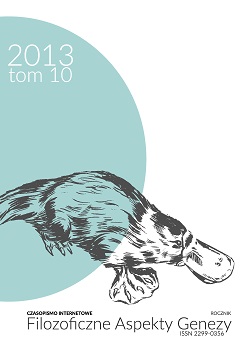Dyskusja nad artykułem Adama Groblera, "Słabości eksplanacyjne teorii inteligentnego projektu"
The Discussion on Adam Grobler’s paper, "The Explanatory Weaknesses of Intelligent Design Theory"
Author(s): Krzysztof J. Kilian, Kazimierz Jodkowski, Dariusz Sagan, Piotr BylicaSubject(s): Philosophy
Published by: Instytut Filozofii, Uniwersytet Zielonogórski
Keywords: Adam Grobler; naturalism; supernaturalism; artificialism; intentional explanation; design detection; testability; metaphysical research program; epistemic framework of science; probability bound
Summary/Abstract: This text is the record of the discussion on Adam Grobler’s paper, „Słabości eksplanacyjne teorii inteligentnego projektu” [The Explanatory Weaknesses of Intelligent Design Theory], conducted by the employees of University of Zielona Góra’s Institute of Philosophy within the scope of meetings of Zielonogórska Grupa Lokalna „Nauka a Religia” [Zielona Góra’s Local Group „Science and Religion”]. Although Grobler’s paper is critical of the intelligent design theory, it differs, to a certain degree, from the standard critiques. Grobler avoids repeating some of the mistakes: he knows that intelligent design theory does not identify the designer with a supernatural being; that this theory is (want to be) neutral in regard to the philosophical controversy between naturalism and supernaturalism; he does not view the theory of evolution as a testable scientific theory, but as a metaphysical research program providing heuristic ideas. He presents also new critical arguments. Grobler recognizes intelligent design as an unscientific theory on the basis, above all, that it offers no intentional explanations regarding the motives of the supposed designer, and thus it provides no heuristic ideas that could be a starting point of scientific research. He thinks also that it is doubtful, whether the bound between what is possible and what is impossible to attain by accumulation of random changes could be specified. In the course of the discussion, its participants indicated the advantages and disadvantages of Grobler’s arguments and engaged in polemics with the views expressed during the debate.
Journal: Filozoficzne Aspekty Genezy
- Issue Year: 2013
- Issue No: 10
- Page Range: 17-63
- Page Count: 47
- Language: Polish

